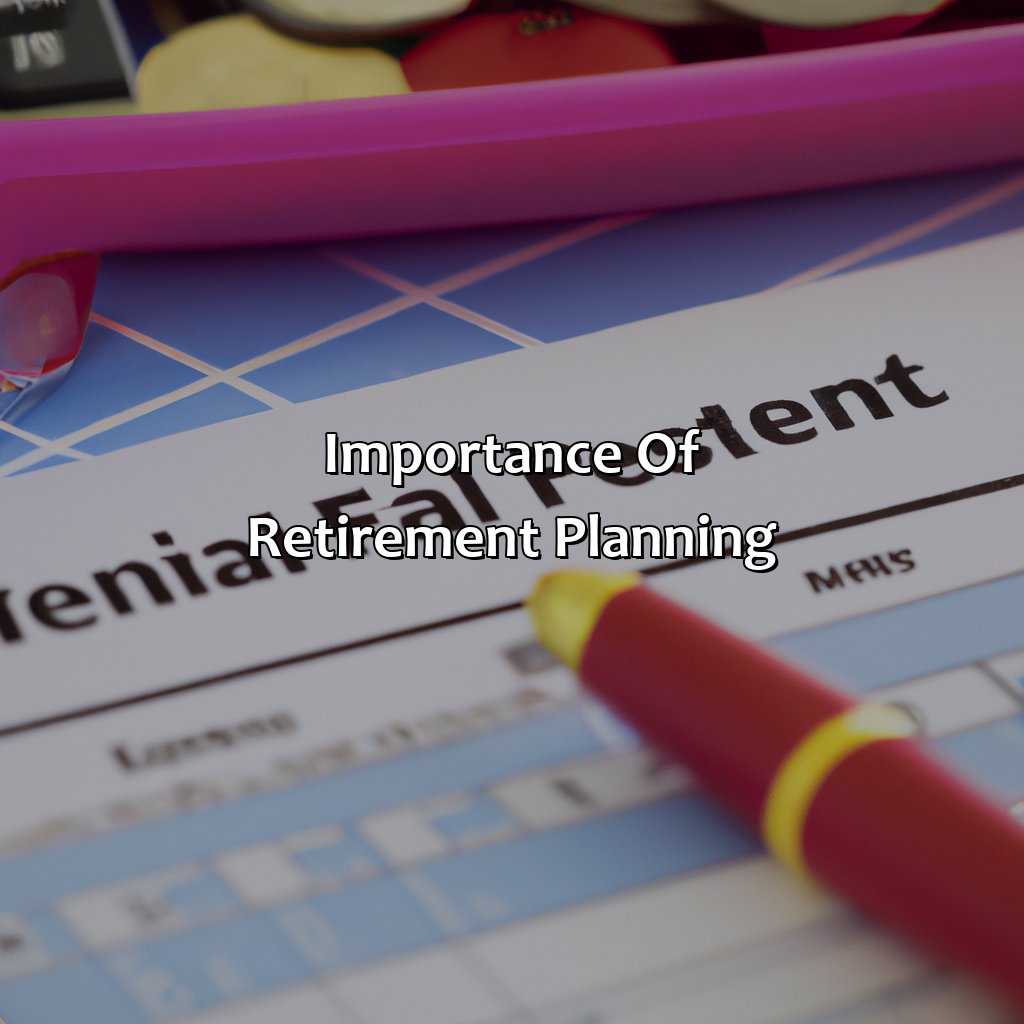How To Save For Retirement In Your 40S?
Key Takeaways:
- Retirement planning is crucial in your 40s: Start planning for retirement as soon as possible to ensure that you have enough savings to last throughout your retirement.
- Calculate your retirement needs: Assess your expenses and create a budget to determine how much money you will need for retirement. Consider health care costs and estimate your social security benefits to calculate your retirement savings goals.
- Maximize retirement accounts: Review and maximize your employer-sponsored retirement plan and consider contributions to a Roth IRA. Consolidate retirement accounts to simplify management and potentially reduce fees.
- Reduce expenses and debt: Create a budget and pay off debts to free up more money for retirement savings.
- Increase retirement savings: Take advantage of catch-up contributions and consider a side hustle to increase retirement savings and secure financial stability.
- Seek professional help: Consult with a financial advisor, attend financial seminars or workshops to make informed decisions and ensure a prosperous retirement.
Are you 40 and stressed about your retirement savings? You don’t have to feel helpless. This article offers practical tips to help you save for retirement in your 40s. Let’s find out how to start planning your financial future!
Importance of Retirement Planning
Retirement Planning – A Crucial Element for a Secure Future
Retirement planning is a fundamental aspect of financial wellbeing, especially as individuals approach their 40s. During this period, it is crucial to strategize, reassess finances, and re-evaluate long-term goals. Retirement planning involves determining what you want your retirement funds to look like and how much you need to save to achieve your goals.
One of the primary reasons why retirement planning is so vital is to ensure that you can maintain your current standard of living after retiring from work. Proactive retirement planning can help you maintain financial stability and avoid jeopardizing your quality of life during retirement.
Moreover, retirement planning offers a host of additional benefits. It can provide peace of mind, reduce the worries and anxiety associated with financial insecurities, and help give you a sense of control over your financial future. By establishing clear financial goals, you can work towards creating a more secure future and plan your retirement in your 40s to make the most of your savings.
It is also important to note that delaying retirement planning can severely impact your retirement options. Neglecting retirement planning can lead to reduced retirement savings, longer working years, less retirement security, and a more significant risk of financial instability during retirement. Therefore, it is crucial to start retirement planning as early as possible.

Image credits: retiregenz.com by James Washington
Assess Your Retirement Needs
Assessing Retirement Needs: A Professional Approach
Determining your retirement needs is crucial in planning for a secure future. Reviewing current earnings, expenses, and investments is essential to ensure sufficient funds for retirement. Assessing your retirement needs entails evaluating desired retirement lifestyle and taking into account other expenses such as healthcare, travel, and leisure.
Consider seeking professional advice to accurately determine retirement needs and explore retirement planning options such as 401(k) plans, IRAs and annuities. A financial advisor can provide comprehensive guidance and identify potential risks.
Additionally, it is essential to review retirement plans and adjust them as necessary. Ensure that investments are diversified, and savings are regularly contributed to. Take advantage of employer matching contributions and maximize deferrals to retirement funds.
To illustrate, Joanne, aged 45, found herself unsure of how much she needed for retirement. After consulting with a financial advisor, she realized her current retirement plan was insufficient. She made adjustments such as increasing her contributions and investing in a more diversified portfolio. This exercise allowed her to early retire at the age of 60, with sufficient funds to fulfill her desired lifestyle.
In summary, assessing retirement needs is a crucial step in retirement planning. Seek professional guidance and review retirement plans regularly to ensure sufficient funds for retirement.

Image credits: retiregenz.com by James Arnold
Review Your Retirement Accounts
As you approach your 40s, it is crucial to assess your retirement accounts regularly. Analyze your retirement plan, pension benefits, 401(k) plans, IRAs, and savings. Ensure they are adequately diversified and invested according to your financial goals, market trends, and risk tolerance.
One of the best ways to review your retirement accounts is to consult with a financial advisor who can provide strategies to maximize your investment’s worth. Review your accounts’ performance, fees, and investment options to make informed decisions.
Moreover, ensure you keep track of your asset allocation, contribution limits, and beneficiary designation. Analyzing these details periodically can help you stay on top of your investments and make necessary adjustments to meet your retirement goals.
Pro Tip: Review your retirement accounts at least once a year or whenever there is a significant life event, such as a job change or a new addition to your family.

Image credits: retiregenz.com by Adam Jones
Reduce Your Expenses and Debt
Reducing expenses and debt can be crucial in securing a comfortable retirement. Follow these simple steps to improve your financial health.
- Assess and categorize your expenses – Identify areas where you can decrease your spending and prioritize debt reduction.
- Make a budget and stick to it – Use your income to create a realistic budget that ensures debt repayment and savings contributions.
- Seek financial advice – Consulting with a professional can help you optimize your resources and plan for a secure retirement.
It is important to remember that reducing expenses and debt is not a one-time fix and requires a long-term commitment to financial planning and discipline.
According to a recent study by the Employee Benefit Research Institute, only 47% of workers have attempted to calculate how much savings they will need for retirement.

Image credits: retiregenz.com by David Jones
Increase Your Retirement Savings
In your 40s, there is still time to boost your retirement savings and secure a comfortable future. Here are some practical steps to help you increase your retirement nest egg:
- Maximize your retirement contributions
- Consider a catch-up contribution
- Reduce your expenses and increase your savings rate
- Diversify your portfolio
- Consult with a financial advisor
It’s essential to note that although increasing your retirement savings may seem overwhelming, it is a vital step for a steady retirement future. Utilizing these steps will help ensure your financial security and independence, both today and throughout your golden years.
To avoid losing out on the opportunity to optimize your savings, it is crucial to take action now. Make an appointment with a financial advisor, choose the best investments, and start making realistic contributions. Remember, the longer you wait, the more challenging it may become to build up sufficient retirement savings. Take action today to secure your future.

Image credits: retiregenz.com by Joel Woodhock
Seek Professional Help
Professional Financial Advice
As you reach your 40s, seeking professional financial advice from a qualified financial planner can provide invaluable assistance in securing your retirement fund. They can create a tailored plan based on your personal situation, risk tolerance and investment goals to maximize your returns and minimize risk.
Additionally, a financial planner can help you review and adjust your retirement plan as needed to ensure you stay on track to meet your goals. Working with a professional will also provide access to financial products and services that you may not be aware of or understand fully.
It is crucial to find a financial planner who is reputable, experienced, and understands your unique financial situation. A certified financial planner (CFP) can be a good start.
Did you know that according to a recent survey conducted by the Transamerica Center for Retirement Studies, only 14% of Americans feel very confident about having enough money saved to retire comfortably?

Image credits: retiregenz.com by Yuval Woodhock
5 Facts About Saving for Retirement in Your 40s:
- ✅ By age 40, financial experts recommend having three times your annual salary saved for retirement. (Source: Investopedia)
- ✅ Maxing out your 401(k) contributions ($19,500 in 2021) can significantly boost your retirement savings. (Source: AARP)
- ✅ Increasing your savings rate by just 1% can have a significant impact on your retirement fund over time. (Source: Fidelity)
- ✅ It’s important to consider the impact of taxes on your retirement savings, and to explore tax-efficient investment strategies. (Source: Forbes)
- ✅ Delaying Social Security benefits until age 70 can increase your monthly payment amount by up to 32%. (Source: The Motley Fool)
FAQs about How To Save For Retirement In Your 40S?
1. How much should I save for retirement in my 40s?
Financial experts recommend saving at least 15% of your pre-tax income for retirement in your 40s. This can be achieved through contributions to a 401(k) or IRA account.
2. Should I consider working with a financial advisor?
Working with a financial advisor can provide personalized guidance and help you create a retirement savings plan that fits your individual needs and goals.
3. What other investment options should I consider?
In addition to contributing to a 401(k) or IRA, you may also want to consider investing in real estate, stocks, or mutual funds. However, it’s important to consult with a financial professional before making any major investments.
4. How can I reduce expenses to save more for retirement?
You can save more for retirement by cutting back on unnecessary expenses, such as eating out or subscribing to services you don’t need. Creating a budget can also help you identify areas where you can cut back.
5. Is it too late to start saving for retirement in my 40s?
No, it’s never too late to start saving for retirement. The key is to start as soon as possible and contribute as much as you can afford. Even small contributions can add up over time.
6. What are the penalties for withdrawing retirement funds early?
Withdrawing retirement funds early may result in penalties and taxes. For example, if you withdraw from a 401(k) before age 59 1/2, you may be subject to a 10% penalty and income taxes on the amount withdrawn.





